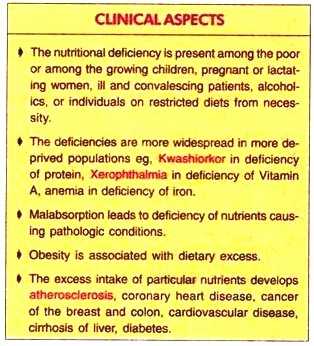ADVERTISEMENTS:
Some diseases are not spread from person to person or by microorganisms or directly or indirectly, these are called non-communicable diseases.
These diseases are caused by the deficiency of some vitamins or nutrients or due to malfunctioning of certain body organs.
Nutritional deficiency diseases:
ADVERTISEMENTS:
When the supply of all nutrients is done in right amount and ratio according to body need, this is called balanced diet.
The lack of any of the required nutrients in the diet is called malnutrition (means faulty or inadequate diet). It leads to deficiency of specific nutrients which is the cause of some diseases called deficiency diseases.
Some nutritional deficiency diseases are as follows:
Protein deficiency:
ADVERTISEMENTS:
Protein deficiency diseases affect the children from age group 1-5 years. The deficiency of proteins, fats and carbohydrates is called as protein energy malnutrition. It leads to two kinds of diseases -Kwashiorkor [Fig. 9.1 (a)] and Marasmus [Fig. 9.1 (b)]. When a child is getting a poor diet in protein, it results a disease known as Kwashiorkor, this disease retards the growth of children.
The children suffering from this problem show some symptoms such as protruding belly, mental retardation, bulging eyes, thin legs like stick and oedema means water retention. When a child suffers from protein and carbohydrate deficiency, it leads to a disease called marasmus. There is no oedema in the children suffering from marasmus, there is no change in skin colour, ribs look very prominent and limbs become very thin, this diseases occurs in infant of up to 1 year of age.
Vitamin deficiency:
Vitamins are very essential for the body although vitamins are not needed by the body in large quantity but required for proper growth and development of body. There are two types of vitamins, viz., fat soluble vitamins such as vitamins, A, D, E and K and water soluble vitamins such as B complex group and vitamin C.
Deficiency of vitamins causes diseases which are as follows:
Mineral deficiency:
The metals, non-metals and their salts are called minerals, because they are mined from the soil, ground or earth’s crust. Minerals are needed in smaller quantity for the growth and development of body, minerals do not supply any energy to the body. Our body can use minerals in the compound form and not as pure elements. Humans get most of the minerals from plant sources.
The following table shows the uses of some minerals in our body:


